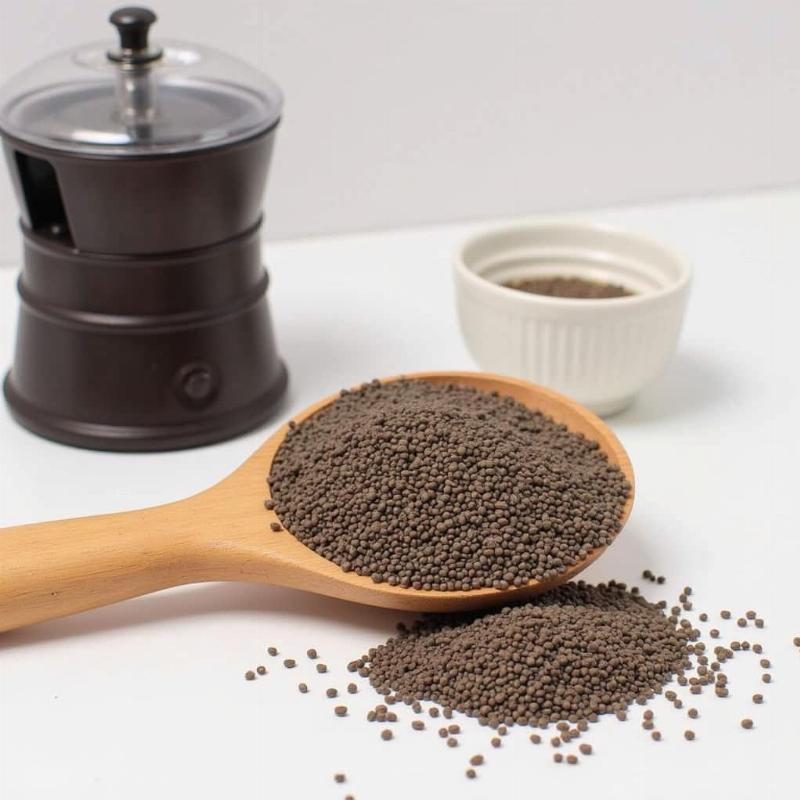Chia seeds are a nutritional powerhouse, packed with fiber, omega-3 fatty acids, and antioxidants, offering various health benefits for our canine companions. But how can you incorporate these tiny seeds into your dog’s diet safely and effectively? This guide will walk you through the best practices for preparing chia seeds for your furry friend, ensuring they reap all the benefits without any digestive upset. We’ll cover everything from portion sizes to preparation methods and address common concerns about feeding chia seeds to dogs.
Soaking Chia Seeds for Optimal Digestion
One of the most common questions about chia seeds for dogs is whether to soak them. The answer is generally yes. Dry chia seeds can absorb moisture in the digestive tract, potentially leading to dehydration or digestive discomfort. Soaking chia seeds creates a gel-like consistency that is much easier for dogs to digest and prevents them from expanding too much in the stomach.
To soak chia seeds, simply mix them with water in a 1:10 ratio. For example, one tablespoon of chia seeds would be mixed with ten tablespoons of water. Let the mixture sit for about 15-20 minutes, or until the seeds have formed a gel. This gel can then be added to your dog’s food.
Grinding Chia Seeds for Enhanced Absorption
While soaking is the most common preparation method, grinding chia seeds is another option, especially for dogs who have difficulty digesting whole seeds. Grinding breaks down the hard outer shell, making it easier for their bodies to access the nutrients inside. You can use a coffee grinder or a food processor to grind chia seeds into a fine powder.
 Grinding Chia Seeds for Dogs
Grinding Chia Seeds for Dogs
How Much Chia Should I Give My Dog?
The general rule of thumb is to start with a small amount, about ¼ to ½ teaspoon per day for small dogs, and up to 1-2 teaspoons for larger breeds. Observe your dog for any digestive issues, and gradually increase the amount if they tolerate it well. Always consult with your veterinarian before adding any new supplements to your dog’s diet, especially if they have pre-existing health conditions.
Benefits of Chia Seeds for Dogs
Chia seeds are a rich source of omega-3 fatty acids, which can help reduce inflammation, improve skin and coat health, and support cognitive function. They are also packed with fiber, aiding in digestion and promoting regular bowel movements. The antioxidants present in chia seeds can help protect cells from damage and boost the immune system.
Are There Any Risks to Feeding Chia Seeds to Dogs?
While chia seeds are generally safe for dogs, some potential risks exist. Feeding excessive amounts of chia seeds can lead to digestive upset, such as diarrhea or bloating. Due to their high fiber content, chia seeds can also interfere with certain medications. Always introduce chia seeds gradually and consult your veterinarian with any concerns.
What If My Dog Doesn’t Like Chia Seeds?
If your dog refuses to eat chia seeds on their own, you can try mixing them with wet food or yogurt. The gel-like consistency of soaked chia seeds can easily be incorporated into various treats or meals. Be patient and persistent, and you’ll likely find a way to make these healthy seeds a part of your dog’s diet.
Conclusion
Chia seeds can be a valuable addition to a balanced canine diet. By following these guidelines for preparation and portion control, you can ensure your furry friend enjoys all the benefits of chia seeds without any digestive discomfort. Remember to consult your veterinarian before making significant changes to your dog’s diet, especially if they have any underlying health issues.
FAQ
- Can puppies eat chia seeds? Yes, but it’s crucial to start with very small amounts and monitor their digestion.
- Can I give my dog dry chia seeds? It’s best to soak or grind chia seeds before feeding them to your dog to prevent digestive issues.
- How do I store chia seeds? Store chia seeds in an airtight container in a cool, dry place.
- What are the signs of chia seed allergy in dogs? Signs may include vomiting, diarrhea, itching, and difficulty breathing.
- Can chia seeds replace fish oil for dogs? While chia seeds are a good source of omega-3s, they may not provide the same levels as fish oil. Consult with your veterinarian.
- How long does it take to see the benefits of chia seeds in dogs? It may take several weeks or months of regular consumption to observe noticeable benefits.
- Can I mix chia seeds with other supplements for my dog? Always consult with your vet before combining supplements to avoid potential interactions.
Introducing Beautdogs.us
Beautdogs.us is your premier destination for all things dog-related in the USA. We offer expert advice on dog breeds, grooming, nutrition, training, and overall well-being. Whether you’re a seasoned dog owner or just starting your journey, Beautdogs.us provides trusted information and resources to help you provide the best possible care for your canine companion. Contact us at [email protected] or +1 501-555-7529 for personalized guidance.